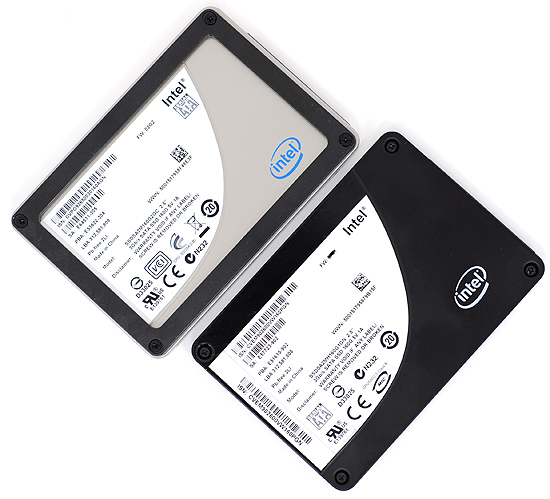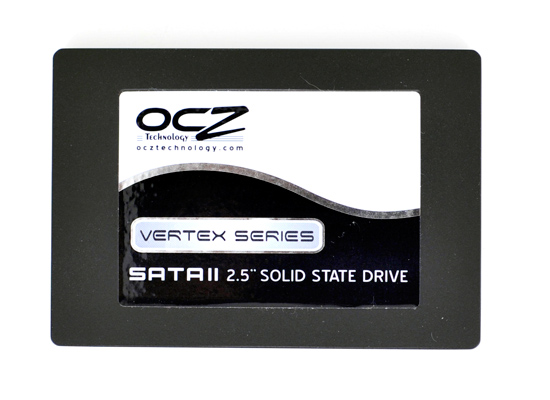The SSD Relapse: Understanding and Choosing the Best SSD
by Anand Lal Shimpi on August 30, 2009 12:00 AM EST- Posted in
- Storage
One Tough Act to Follow
What have I gotten myself into? The SSD Anthology I wrote back in March was read over 2 million times. Microsoft linked it, Wikipedia linked it, my esteemed colleagues in the press linked it, Linus freakin Torvalds linked it.
The Anthology took me six months to piece together; I wrote and re-wrote parts of that article more times than I'd care to admit. And today I'm charged with the task of producing its successor. I can't do it.
The article that started all of this was the Intel X25-M review. Intel gave me gold with that drive; the article wrote itself, the X25-M was awesome, everything else in the market was crap.

Intel's X25-M SSDs: The drives that started a revolution
The Anthology all began with a spark: the SSD performance degradation issue. It took a while to put together, but the concept and the article were handed to me on a silver platter: just use an SSD for a while and you’ll spot the issue. I just had to do the testing and writing.

OCZ's Vertex: The first Indilinx drive I reviewed, the drive that gave us hope there might be another.
But today, as I write this, the words just aren't coming to me. The material is all there, but it just seems so mature and at the same time, so clouded and so done. We've found the undiscovered country, we've left no stone unturned, everyone knows how these things work - now SSD reviews join the rest as a bunch of graphs and analysis, hopefully with witty commentary in between.
It's a daunting, no, deflating task to write what I view as the third part in this trilogy of articles. JMicron is all but gone from the market for now, Indilinx came and improved (a lot) and TRIM is nearly upon us. Plus, we all know how trilogies turn out. Here's hoping that this one doesn't have Ewoks in it.
What Goes Around, Comes Around
No we're not going back to the stuttering crap that shipped for months before Intel released their X25-M last year, but we are going back in the way we have to look at SSD performance.
In my X25-M review the focus was on why the mainstream drives at the time stuttered and why the X25-M didn't. Performance degradation over time didn't matter because all of the SSDs on the market were slow out of the box; and as I later showed, the pre-Intel MLC SSDs didn’t perform worse over time, they sucked all of the time.
Samsung and Indilinx emerged with high performance, non-stuttering alternatives, and then we once again had to thin the herd. Simply not stuttering wasn't enough, a good SSD had to maintain a reasonable amount of performance over the life of the drive.
The falling performance was actually a side effect of the way NAND flash works. You write in pages (4KB) but you can only erase in blocks (128 pages or 512KB); thus SSDs don't erase data when you delete it, only when they run out of space to write internally. When that time comes, you run into a nasty situation called the read-modify-write. Here, even to just write 4KB, the controller must read an entire block (512KB), update the single page, and write the entire block back out. Instead of writing 4KB, the controller has to actually write 512KB - a much slower operation.
I simulated this worst case scenario performance by writing to every single page on the SSDs I tested before running any tests. The performance degradation ranged from negligible to significant:
| PCMark Vantage HDD Score | New | "Used" |
| Corsair P256 (Samsung MLC) | 26607 | 18786 |
| OCZ Vertex Turbo (Indilinx MLC) | 26157 | 25035 |
So that's how I approached today's article. Filling the latest generations of Indilinx, Intel and Samsung drives before testing them. But, my friends, things have changed.
The table below shows the performance of the same drives showcased above, but after running the TRIM instruction (or a close equivalent) against their contents:
| PCMark Vantage HDD Score | New | "Used" | After TRIM/Idle GC | % of New Perf |
| Corsair P256 (Samsung MLC) | 26607 | 18786 | 24317 | 91% |
| OCZ Vertex Turbo (Indilinx MLC) | 26157 | 25035 | 26038 | 99.5% |
Oh boy. I need a new way to test.










295 Comments
View All Comments
albor - Friday, June 18, 2010 - link
Hi,try RamDisk Plus 11 from SuperSpeed.
(http://www.superspeed.com/desktop/ramdisk.php)
I use it on Xp pro 32 bit with 30 GB OCZ Vertex and 8 GB RAM. All above 3.2 GB is configured for swap and temp. Works perfectly and no visible SSD performance degradation after about 10 months.
Greetings.
jmr3000 - Thursday, August 23, 2012 - link
would explain to me how did you install it?the ssd as a second drive or did u install all the program on the ssd and use the hhd as a second?
thanks in advance!
jm
marraco - Friday, August 13, 2010 - link
SWAP file is one of the most important speed bottleneck on windows.it writes frequently to disk, so consumes the read write cicles of the disk, reducing his useful life.
But you are not buying space storage when you buy SSD. You are buying speed, so it makes nosense to buy an expensive SSD, and then remove from it all the activities that need the speed and are bottlenecks.
you buy a SSD to do the fastest SWAP. keep it on SSD.
Also, drive indexing permanently does a lot of reads, but it does not matter if the disk is fast. Drive indexing is like a little local google. If you disable it, and then search for all the files with a given text on it, searching the entire disk takes longer than just read an indexing.
Those activities consume the useful life of the disk, but at the time the disk gonna need replacement, (5 years, maybe), this disk gonna need replacement anyways, and new SSD gonna be dirty cheap, so it makes no sense to disable swap, temp files, and indexing.
On other side, prefetch, superfetch and defrag most probably are better disabled under SSD.
jimlocke - Wednesday, June 1, 2011 - link
Pehu, I know this much after your posting, but I was curios what you ended up doing for swap.8GB of RAM almost seems like swap may not be needed, unless you have several memory-hogging apps open.
Hope you still like your SSD. I'm looking at getting one soon, and agree this was an excellent article!
-Jim
krumme - Friday, October 9, 2009 - link
First: I submit to the importance of random 4k for ssd.Second: Over the years I have highly valued the articles of Anand. It is remarkable to see such detailed and enthusiastic information.
Now I have a few questions, following the general impact of this work.
Some observations first:
Following an article at Toms of a ssd article the 6 of September. The author was called a “Moron”, primarily as the random 4k synthetic bm was missing. The author was giving a different opinion on the indilinx vs intel, in the desktop sector, compared to Anand, giving more weight to transfer vs iops.
In an discussion about a Kingston V-series review, one said that he would take the indilinx ssd any day because it was “750 times faster” – an argument based on iops.
Another remark I have read several times is: “The Intel x25-M g2 is the only drive to get”.
Another is: “I would like to buy the Dell xx, but it has an Samsung controller so its of no use”.
I think it is time to stop, and make sure there is reason in what is happening for normal desktop use.
Do we have blind test where to tell the difference between the Intel, Samsung and Indilinx?
What is the actual real world bm fx. Win7 boot times for the 3 controlers?
There is something called good enough. When is 4k random read/write time enough, to not notice any subjective improvement afterwards in win7? Could it be fx. 10M/s?
The ssd is the best thing happening since 3d gfx, but I think we should enjoy what is happeing right now, because this time, could be the turning point where we soon are focusing on small differences.
Anyone knows what´s the next big thing?
bebby - Friday, October 30, 2009 - link
Random 4k and its relevance for desktop use is really the main topic for me, too.If I assume that I only use the SSD for the OS and software and save my data on other, much less expensive HDDs, I doubt very much that this discussion is worth it. The Samsung SSD then suddenly looks not so bad at all and much cheaper...
The next big thing for me would be an OS starting up in 5 seconds, like the OS we had in the 90s...making SSD obsolete.
bebby - Friday, October 30, 2009 - link
Random 4k and its relevance for desktop use is really the main topic for me, too.If I assume that I only use the SSD for the OS and software and save my data on other, much less expensive HDDs, I doubt very much that this discussion is worth it. The Samsung SSD then suddenly looks not so bad at all and much cheaper...
The next big thing for me would be an OS starting up in 5 seconds, like the OS we had in the 90s...making SSD obsolete.
marraco - Friday, August 13, 2010 - link
I agree completely. I think that human beings can nottice the difference between a hard disk, and a non bad SSD, because the difference is too large, but over "good enough", it does not matter much if the SSD is 2X or 4X faster in 4Kb random R/W.But mine is just an opinion, and I don't have good data to test it. I would like to read an article with repeatable testing on human perception.
SimesP - Wednesday, September 23, 2009 - link
I haven't read all 254 comments (yet) but I'd like to add my thanks to everyone elses for the comprehensive and illuminating article. This, along with the previous AnandTech SSD articles have increased my understanding of SSD's immensely.Thanks again!
ClemSnide - Friday, October 2, 2009 - link
Anand,A couple of guys from HotHardware.com pointed me at your SSD article, and it allowed me to make an informed decision. Thanks!
I wanted to speed up one game in particular (World of Warcraft) as well as routine OS tasks and web browsing. I think an SSD will do a bang-up job on at least the first two. The one I decided upon was the OCZ Agility 60 GB, which offers some growth room; I currently have 40 GB on my system drive. I know the Intel has better numbers, but I was able to get the OCZ for $156 after a rebate, which translates to decent performance at a price I can justify. (For the curious, it's available from TigerDirect for $184, and OCZ is giving a $30 rebate.)
Even though my system build is still months away, this should be usable on my old clunker as well. Very nifty!